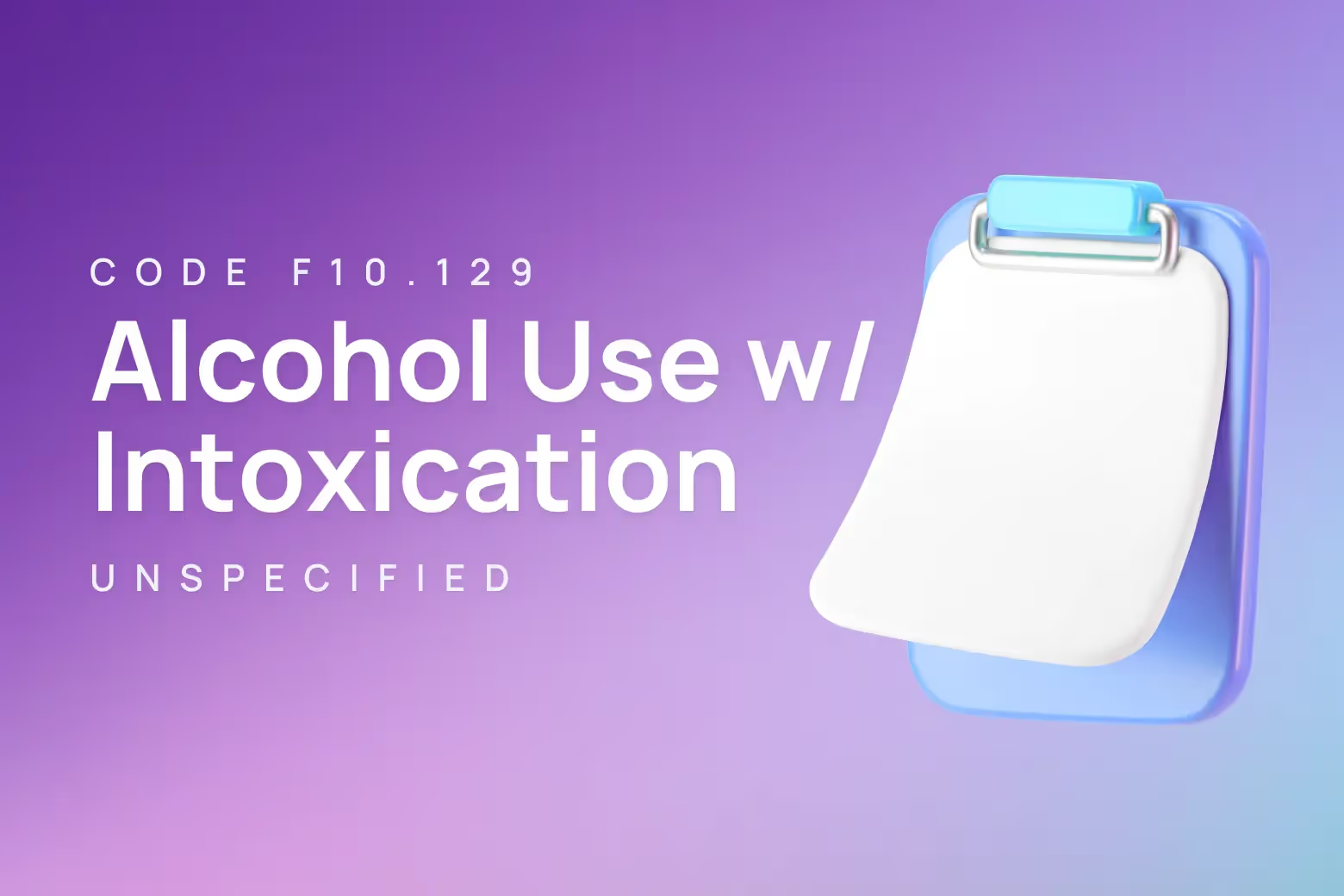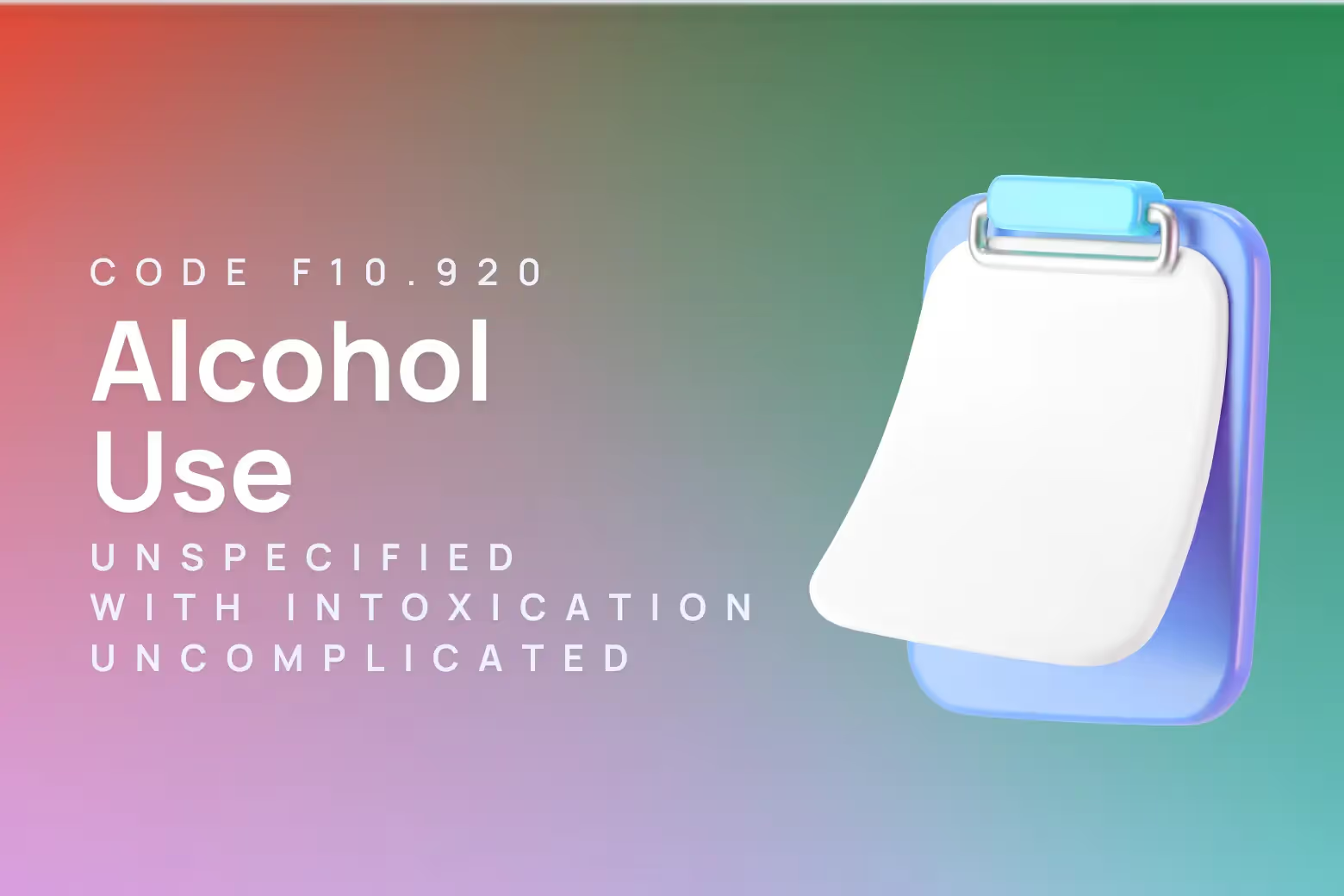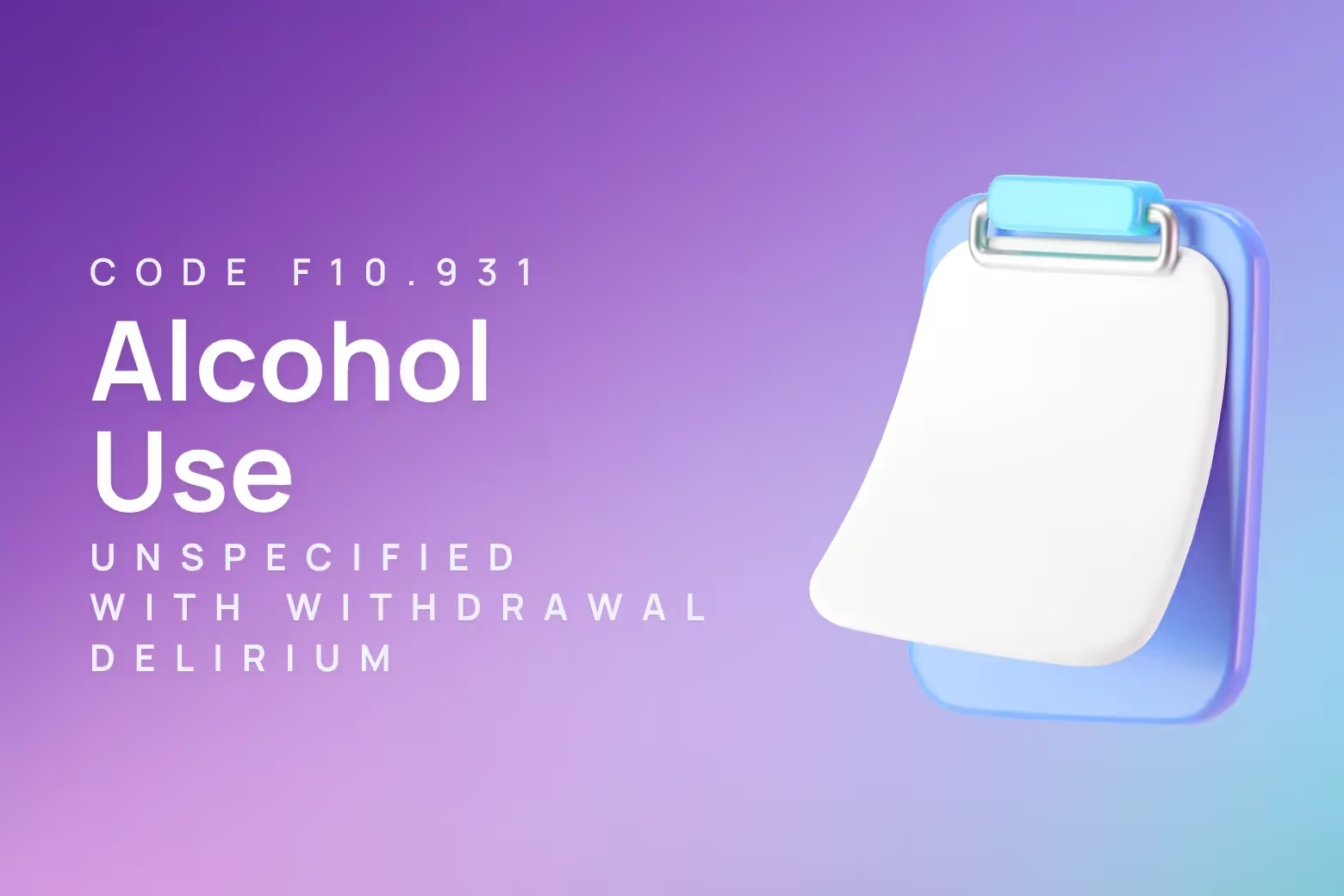ICD-10 code for alcohol abuse with intoxication, unspecified

F10.129 is the ICD-10 code for alcohol abuse with intoxication, unspecified.
This diagnostic code indicates the presence of both a mild alcohol use disorder and current alcohol intoxication when the specific type of intoxication cannot be determined.
Proper coding accuracy remains essential for treatment planning and insurance authorization decisions.
Key features:
- F10.129 ICD-10 code combines mild alcohol use disorder (2-3 symptoms) with active intoxication
- Used when intoxication type is unspecified or uncertain
- Indicates comorbid substance abuse and acute impairment
- Requires evidence of both pattern of problematic use and current alcohol effects

Diagnostic criteria for alcohol abuse with intoxication (F10.129)
F10.129 represents a complex diagnostic situation where clinicians identify both problematic alcohol use patterns and active intoxication symptoms. This code specifically applies when a mild alcohol use disorder coexists with current alcohol intoxication.
The diagnosis requires meeting criteria for alcohol use disorder with 2-3 symptoms present within a 12-month period. These symptoms include:
- consuming alcohol in larger amounts than intended
- persistent desire to reduce use
- significant time spent obtaining or recovering from alcohol
- cravings
- role obligation failures
- continued use despite interpersonal problems
- reduced activities due to alcohol
- hazardous use situations
- use despite physical or psychological problems
- tolerance development
- withdrawal experiences
Concurrent intoxication symptoms must also be evident during the clinical encounter. Physical indicators may include:
- alcohol breath odor
- facial flushing
- poor self-care
- bloodshot eyes
- coordination difficulties
The "unspecified" designation applies when clinicians cannot determine whether intoxication is uncomplicated, involves delirium, or presents with other specific features.
Biological markers can support diagnostic assessment when clinical presentation remains unclear.
Blood or breath alcohol measurements confirm recent consumption, while liver function tests and other indirect markers provide evidence of chronic alcohol exposure patterns that support the underlying use disorder diagnosis.
When to use F10.129 diagnosis code
F10.129 serves as the appropriate diagnostic code when clients present with both mild alcohol use disorder and current intoxication symptoms that cannot be further specified.
Understanding differential diagnosis helps ensure accurate coding and appropriate treatment planning.
F10.129 vs F10.120 (Alcohol abuse with intoxication, uncomplicated)
F10.120 applies when intoxication presents without additional complications like delirium, perceptual disturbances, or cognitive impairment. The client shows clear signs of alcohol impairment but remains coherent and oriented without severe complications.
F10.129 becomes the preferred code when clinicians cannot determine the specific nature of intoxication or when information remains insufficient to specify uncomplicated status. This often occurs in emergency settings or when clients cannot provide reliable history due to their current state.
F10.129 vs F10.121 (Alcohol abuse with intoxication, delirium)
F10.121 requires clear evidence of delirium accompanying intoxication, including altered consciousness, cognitive disturbance, and fluctuating symptoms. Clients present with confusion, disorientation, or perceptual disturbances beyond typical intoxication effects.
F10.129 applies when delirium symptoms are unclear or when cognitive impairment could result from intoxication alone rather than true delirium. Clinicians use this code when they cannot definitively establish delirium presence during the assessment.
F10.129 vs F10.229 (Moderate to severe alcohol use disorder with intoxication)
F10.229 indicates moderate to severe alcohol use disorder (4 or more symptoms) combined with intoxication. These clients demonstrate more extensive patterns of problematic use with greater functional impairment and more severe consequences.
F10.129 specifically requires only mild alcohol use disorder (2-3 symptoms) with less severe functional impact. The distinction depends on symptom count and severity of life disruption rather than intoxication presentation.
Related ICD-10 codes
Related alcohol intoxication codes within the F10.12 family include:
- F10.12 - Alcohol abuse with intoxication
- F10.120 - Alcohol abuse with intoxication, uncomplicated
- F10.121 - Alcohol abuse with intoxication, delirium
Interventions and CPT codes for alcohol abuse with intoxication
Evidence-based treatment approaches for F10.129 address both acute intoxication management and underlying alcohol use patterns.
Therapeutic interventions focus on safety stabilization, motivational change work, and skill development for sustained recovery.
Motivational interviewing approaches
Motivational interviewing serves as a first-line intervention for clients with alcohol use concerns, particularly those with ambivalence about change.
This collaborative approach helps clients explore their own reasons for reducing alcohol use rather than confronting resistance directly.
The technique proves especially effective for individuals with milder forms of alcohol use disorder who may not recognize the extent of their problems.
Therapists express empathy, develop discrepancy between current behavior and personal values, and support self-efficacy for change.
CPT codes:
- 90791 for initial psychiatric evaluation
- 90834 for individual psychotherapy (45 minutes)
- 90837 for extended individual sessions (60 minutes)
Cognitive behavioral therapy interventions
Cognitive behavioral therapy addresses the cognitive, emotional, and situational factors that contribute to problematic drinking patterns.
Treatment typically includes 12 weekly sessions focusing on identifying triggers, developing coping strategies, and modifying dysfunctional thoughts about alcohol.
CBT components include cognitive restructuring of alcohol expectancies, high-risk situation management, coping skills training, and non-drinking activity development.
The approach shows strong evidence for effectiveness as both standalone treatment and in combination with other interventions.
CPT codes:
- 90834 for standard individual CBT sessions
- 90837 for extended sessions
- 90853 for group therapy applications.
Screening and brief intervention services
Screening, Brief Intervention, and Referral to Treatment (SBIRT) protocols prove particularly valuable for clients presenting with F10.129 symptoms.
These services combine standardized screening with brief motivational counseling to address alcohol misuse patterns.
SBIRT approaches work well in emergency departments, primary care settings, and other medical environments where clients may present with intoxication symptoms.
The brief nature makes it suitable for clients who might not otherwise engage with traditional alcohol treatment services.
CPT codes:
- 99408 for brief intervention (15-30 minutes)
- 99409 for extended brief intervention (over 30 minutes)
- G0396 and G0397 for Medicare SBIRT services
- H0049 for alcohol screening
- H0050 for brief intervention per 15 minutes.
How Upheal improves F10.129 ICD-10 documentation
Clinical documentation platforms can significantly improve the accuracy and compliance of F10.129 coding while reducing the administrative burden that often interferes with direct client care.
Suggesting appropriate ICD-10 codes based on session content
Advanced documentation tools analyze session content to identify symptoms and presentations that align with specific diagnostic criteria.
When clients describe patterns consistent with mild alcohol use disorder combined with current intoxication symptoms, the platform can suggest F10.129 as the appropriate code.
This automated code suggestion reduces the risk of miscoding while ensuring that documentation captures the complexity of co-occurring alcohol abuse and acute intoxication.
The system recognizes key phrases and symptom presentations that distinguish F10.129 from related codes in the alcohol intoxication family.
Maintaining HIPAA-compliant records with proper diagnostic coding
Documentation platforms maintain strict privacy protections while ensuring that diagnostic codes align with clinical presentations and payer requirements. Proper coding supports treatment authorization and helps justify medical necessity for continued services.
The platform tracks diagnostic consistency across sessions, flagging potential coding errors that could result in claim denials or compliance issues. This systematic approach reduces documentation mistakes while maintaining focus on therapeutic work with clients.
Reducing administrative burden so you can focus on client care
Automated documentation generation allows clinicians to spend more time on direct therapeutic interventions rather than manual record-keeping tasks.
The system creates comprehensive session notes that incorporate appropriate diagnostic codes without requiring extensive post-session documentation time.
By handling routine documentation tasks, clinicians can maintain better focus during sessions and provide more attentive care to clients presenting with complex conditions like alcohol abuse with intoxication.
This improved clinical focus often leads to better therapeutic outcomes and stronger therapeutic relationships.
Supporting clients with alcohol abuse and intoxication
Clients presenting with F10.129 require careful attention to both immediate safety concerns and longer-term recovery planning.
The combination of ongoing alcohol abuse patterns with acute intoxication creates unique clinical challenges requiring comprehensive assessment and intervention.
Initial treatment focus should address safety stabilization and medical clearance before proceeding to therapeutic interventions.
Clients may require observation for withdrawal symptoms as intoxication resolves, particularly if they have history of seizures or other serious withdrawal complications.
Therapeutic work typically begins with motivational interviewing to address ambivalence about changing drinking patterns.
Many clients with mild alcohol use disorder retain significant functional capacity and may not immediately recognize the need for treatment. Building intrinsic motivation proves more effective than confrontational approaches that may increase resistance to change.
Long-term recovery planning should incorporate coping skills development, relapse prevention strategies, and support system activation.
Clients benefit from learning to identify triggers for both excessive drinking and high-risk situations that could lead to dangerous intoxication episodes.
Family involvement often proves valuable when clients remain connected to supportive relationships.
Upheal's clinical documentation platform helps behavioral health providers create thorough, compliant documentation for complex presentations like F10.129 while maintaining focus on quality client care.
The system's automated code suggestions and comprehensive note generation support accurate diagnosis and treatment planning.
Try Upheal for free to experience improved documentation efficiency and clinical focus in your practice.













